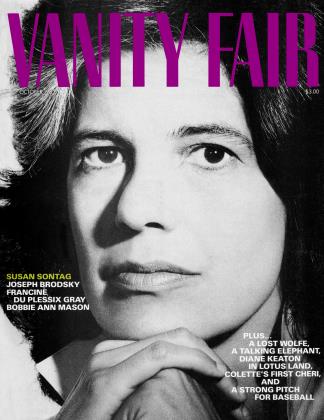Sign In to Your Account
Subscribers have complete access to the archive.
Sign In Not a Subscriber?Join NowTUSCANY
" THERE IS NO WORD IN THE ITALIAN LANGUAGE FOR PRIVACY. THE ITALIANS DO NOT UNDERSTAND WHAT IT MEANS"
Alexander Chancellor
Of all the peoples of Europe, the Tuscans must be among the least hostile to foreigners. This is because they are so used to them. Foreigners, particularly northern Europeans, have been visiting or living in Tuscany for centuries, drawn there originally by the astounding artistic achievements of the Renaissance and perhaps even more today by the beauty of the landscape and the charms of Tuscan rural life. The foreigner feels at home in Tuscany, not because the Tuscans try to make him so, but because they are not surprised at his presence and do not question his right to be there. Houses in Tuscany are now much more expensive than they used to be, but until a few years ago there was a seemingly endless supply of abandoned peasants' houses in the hills south of Florence which could be picked up by foreigners at remarkably low prices. And very nice houses too—far bigger, more spacious and solid than English country cottages, built of stone with beamed ceilings and tiled floors, with huge fireplaces and arched loggias open to the elements. The English have been in the vanguard of this modern colonization of Tuscany.
No other place can better satisfy the urban Englishman's nostalgia for the simple country life. And he can indulge himself without any pricks to his liberal conscience. As his0 house is usually empty when he buys it, he has displaced nobody. The native population is not poor, as in some Mediterranean regions, but generally very prosperous. Yet the Tuscans remain tied to traditional forms of agriculture that preserve the rich variety of the landscape and allow the foreigner to enjoy the illusion that he is living amid a noble race of simple peasants. He will discover in due course that they are in fact sophisticated and quite often as rich as he is, if not richer. They own large, modern cars, they have glistening modern kitchens and wellstocked drink cabinets, and they spend their holidays in exotic places.
It is indeed because Tuscans have become prosperous in recent years that they have relinquished their farmhouses to foreigners, who in turn enjoy conducting themselves like peasants. The making of wine and the pressing of olives are pursuits which the sun-starved northern European takes to with passionate enthusiasm, usually improving on the technique of the natives while ensuring that nothing is done that
could spoil the appearance of the landscape. The landscape remains remarkable and, despite the total indifference of the Tuscans to its aesthetic qualities and their readiness to implant modern villas or factories in the most beautiful places, still looks in parts almost identical to the landscapes painted by Leonardo da Vinci. Tuscany is the home of the cypress, the vine, and the olive, producing the best olive oil in the world and some of the worst wine, only because the peasants are so bad at making it. Particularlv satisfving to the foreigners is to be able to make better wine than the peasants do.
Most foreigners do not want to be peasants all the time, any more than the natives do. Luckily for them there are other diversions. "They can, if they wish, immerse themselves in culture, for Tuscany has more art treasures to inspect than any other patch of earth in the world. They build swimming pools in which to cool themselves in summer. And they spend a great deal of time visiting one another. The landed gentry of the region are foreign to a degree that must be unique in the world. The foreigners are not a beleaguered class clinging together for comfort, but are almost as thick on the ground as the country squires of England. Near Arezzo the foreigners are mainly not British but Americans—Californians, to be precise. It is something of a mystery why Californians have recently taken to Tuscany. Those who have fallen in love with the place in the summer are often quite unprepared for the hardships of winter, heating a drafty peasant's house. Again it is the dream of the peasant life that attracts them, and they give themselves hernias and heart attacks in their efforts to make it a reality.
Foreigners tire of being peasants and wish to rely upon the services of others. They often find that money cannot buy them help. Tuscany is a communist society. Its people are well off and they are not attracted by domestic service. Laboring in other people's vineyards is unfashionable —a pursuit identified with the bad old days before the dawn of progress. And there is another thing that undermines the foreigners' dream. No matter how lost in the countryside a house seems to be, no day will pass without somebody wandering round it—hunting for birds or wild boar or mushrooms, or just sizing it up for a burglary. One Californian woke up to discover his driveway blocked by cars when his house was chosen as the headquarters for a wild-boar hunt. The one unattainable pleasure in Tuscany is solitude. There is no word in the Italian language for privacy. The Italians do not understand what it means.
 View Full Issue
View Full Issue






Subscribers have complete access to the archive.
Sign In Not a Subscriber?Join Now